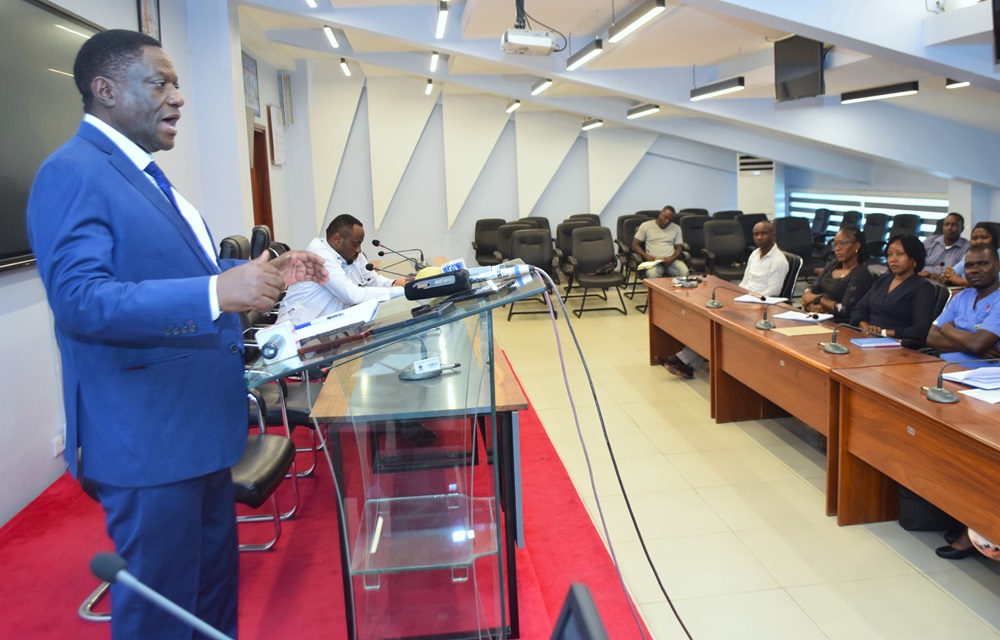UDSM and JKCI to jointly offer groundbreaking training on critical care, emergency and dialysis nursing
By Mercy Machange, CMU
In a significant development for healthcare education, the University of Dar es Salaam, in collaboration with the Jakaya Kikwete Cardiac Institute (JKCI), is offering a training on competence-based critical care, emergency nursing and dialysis nursing.
Speaking at the launch of this programme in Dar es Salaam recently, UDSM Deputy Vice Chancellor-Academic, Prof. Bonaventure Rutinwa, said that the objective of the training programme, which would run for 30 weeks from 11th March 2024, was to create a workforce of critical care nurses equipped with the relevant knowledge and skills.
“The skills and knowledge will enable them to provide high-quality nursing care services to patients admitted in critical care, dialysis units and accident and emergency settings. The focus areas of this course include how to offer basic and advanced critical care nursing; emergency nursing and dialysis nursing”, said Prof. Rutinwa.
Prof. Rutinwa said that the facilitators of the training were from both the University of Dar es Salaam, through its Mbeya College of Health and Allied Sciences (MCHAS) and JKCI. “The theory part of the training will take place at the Continuing Education Unit of UDSM while JKCI will be in charge of the practical aspects”.
He emphasised that UDSM decision to partner with JKCI was rooted in the necessity to provide integrated medical and science training and ensure practical training that cultivated highly skilled professionals. He also said that both institutions had received approval from regulatory authorities to commence their groundbreaking collaboration, starting with concise yet impactful training programmes.
He said participants of the training were registered nurses with minimum education of diploma in Nursing/Midwifery from any institution recognised by Tanzania Nursing and Midwifery Council or holders of Bachelor of Science in Nursing, Bachelor of Science in Midwifery, and Bachelor of Nursing Education.
“Those with a Master of Science in Nursing and who have a valid license to practice from Tanzania Nursing and Midwifery Council or equivalent in their countries can also apply for this course. Foreigners of the same qualifications are also accepted”, he said.
Revolutionising medical care
Meanwhile, the Executive Director of JKCI, Dr. Peter Kisenge, said the collaboration between UDSM and JKCI would revolutionise medical care by introducing cutting-edge techniques in heart and kidney treatment and that their focus would be on training professionals to master advanced patient care, critical care supervision, and life-saving skills.
“There is an urgent need for skilled healthcare professionals; so it is very important to establish degree and sub-degree programmes specialising in groundbreaking heart surgery and advanced care for small heart openings”, said Dr. Kisenge.
He added that, "In a country with fewer than 50 specialised heart doctors and a population exceeding 60 million, there is an undeniable need for a skilled workforce. Our commitment is to bridge this gap by training professionals capable of providing exceptional services”.
Dr. Khuzeima Khanbhai, a specialist in opening blocked heart vessels, also expressed his excitement about the pioneering nature of these training programmes. "These programs mark a historic first for East and Central Africa. We are pioneering training that includes unblocking heart vessels in the event of a heart attack, contributing to a surge in healthcare professionals in the country," emphasised Dr. Khanbhai.
Meanwhile, it was informed that the two institutions are also in the process of establishing a formal collaboration where UDSM-MCHAS will be offering postgraduate programmes in cardiac related areas.
Through this collaboration, both institutions will have benefits such as enhancement of a range of academic programmes; expanding access to research areas and facilities; establishing a strategic regional network; access to teaching and research facilities; and use of highly specialised experts from both institutions.


